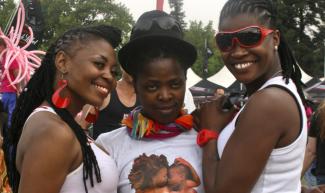Sexual minorities
Look through “LGBT glasses”

Their human rights to fully develop their personality and express their feelings are suppressed. According to activists supporting sexual minorities, the situation is getting worse in many African, Latin American and Asian countries.
At the international level, campaigns are gaining force to improve matters. In a resolution of May 2014, for instance, the African Commission on Human and Peoples’ Rights criticised violent attacks against people because of their sexual orientation. To address issues in daily life and change people’s attitudes, activists in developing countries need financial and other kinds of support. Increasingly, agencies from rich nations are rising to the challenge.
So far, such efforts have rarely been evaluated, but the German Institute for Human Rights and Dreilinden, a private trust that promotes acceptance of gender diversity, have recently published their third assessment of what German agencies are doing in this context. When they published the first study of this kind in 2009, that was pioneering work. Back then, only 11 of the 65 reviewed state agencies and civil-society organisations engaged in developmental affairs were supporting the rights of sexual minorities. According to the recent study “Regenbogen-Philanthropie 3” (Rainbow philanthropy 3) published in 2014, the number has risen to 26.
It is still rare for development agencies to run projects that include aspects for lesbians, gay, bisexual and transgender (LGBT) people. Funding is a challenge. The authors of the report plead not to draw a line between general human-rights issues and LGBT-related work. They argue that projects that aim to reinforce the freedom of speech should also help homosexuals to express their sexual orientation freely. The rights to self-determination and free speech apply to LGBT people as much as to anybody else. The researchers propose to consider things through LGBT glasses.
The report states that German agencies should do more. One relevant aspect is that, in countries where homosexual love is considered a crime, support for LGBT people is considered criminal as well. The authors want German organisations to cooperate with local partners who can offer insight and helpful entry points.
The collected data allowed the authors to compare German funding activities to international ones. While agencies from other countries have been increasing funding in support of sexual minorities, German funding has decreased. The authors state there is a lack of transparency so it is difficult to gather data.
The available data indicates that one third of related funding from Germany went to Africa, more than to any other continent. Most of it went to South African organisations. Projects for HIV prevention and transgender people were launched there. South Africa’s legislation is progressive and protects the human rights of LGBT people. A large share of the money, moreover, benefitted international projects that are not limited to one single country.
The research found that more than half of the agencies involved in LGBT matters are civil-society organisations, and that they provide most of the funds. On the other hand, the Federal Ministry for Economic Cooperation and Development was among the top three donors that disbursed 60 % of the total reported funds. It spent € 250,000, Dreilinden spent € 290,000 and the Heinrich Böll Foundation, which is close to the Green party and relies on public funds, spent € 300,000.
Ultimately, it depends on the organisations what contribution they can make to improve the situation for LGBT people. The authors of the study stress the fact there is still a lot of work to be done and the awareness for this issue has to spread.
Rebecca Renz
Link:
Regenbogen-Philanthropie 3 (in German):
http://www.institut-fuer-menschenrechte.de/uploads/tx_commerce/Regenbogen-Philanthropie-3_barrierefrei.pdf







